Have you ever wondered how much it costs to create a mobile gaming app? Of course, you may have a calculative amount in mind, but would it be enough to get things moving in the right direction? No right!
A gaming software may be made for as little as $0 or as much as $174 million, the most expensive game ever made.
Understanding development expenses as a whole is essential before beginning to design a mobile gaming app. It will help you create a solid budget, as well as guarantee wise resource distribution and successful risk reduction.
We’ll go into great detail on mobile game app development expenses, important factors, low-cost methods, and much more in today’s tutorial.
Before we begin, let’s examine the statistics for mobile gaming apps!
Overview of Mobile Gaming App Statistics
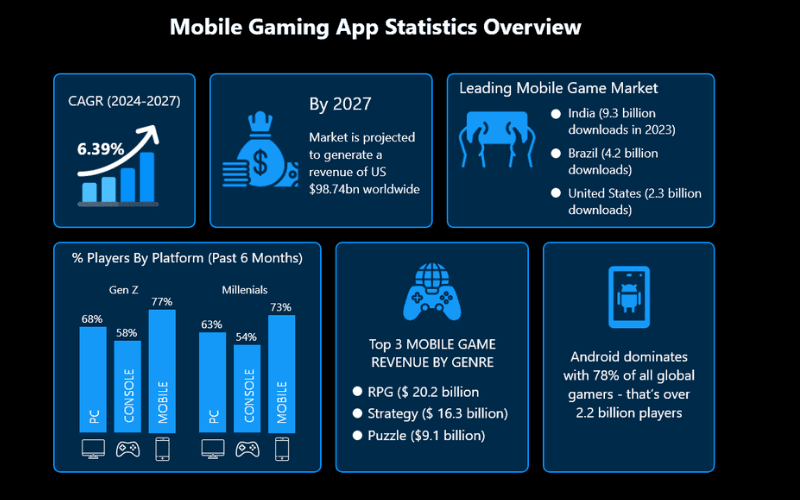
As of 2024, The $92.6 billion worldwide mobile gaming business is a testament to the industry’s unparalleled growth. This astounding number demonstrates the industry’s strong expansion and the growing demand for mobile gaming experiences.
It’s important to remember that, depending on complexity and features, the typical cost to produce a mobile game can range from $10,000 to $250,000 for creators anticipating potential income. For developers hoping to enter growing markets and benefit from the industry’s rising tendency, understanding these patterns is essential.
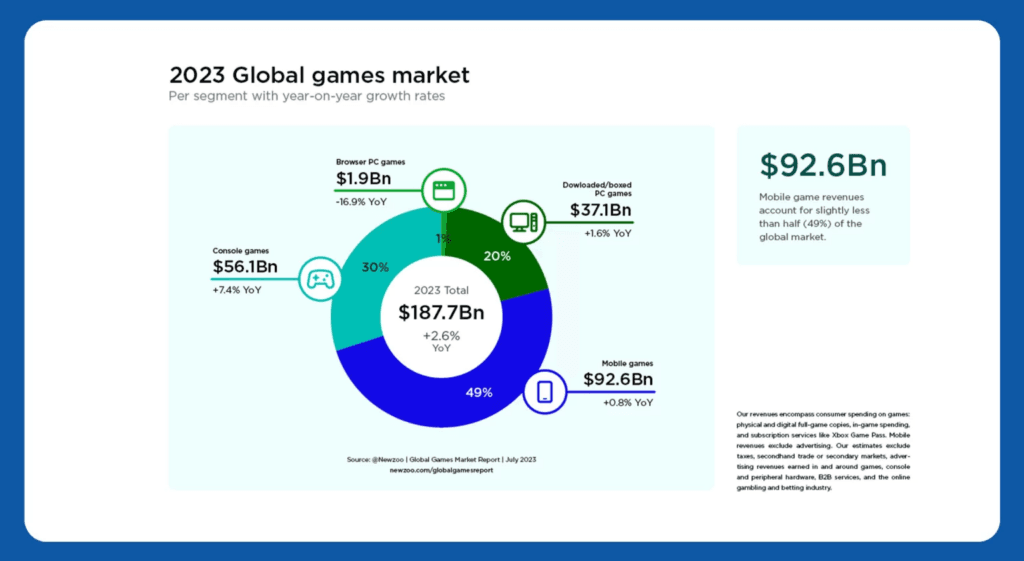
- With US$46,470.00 million in sales in 2023, the US tops the world in revenue generation.
- In the mobile games industry, the average revenue per user (ARPU) is expected to reach US$90.16 in 2023.
- By 2030, the mobile gaming market is projected to grow to a value of USD 284.4 billion.
- 49% of mobile players say they have spent money on mobile gaming.
Since game development services account for a large portion of these statistics, we offer the best investment guide available for entrepreneurs, app developers, and investment strategists to assist you in navigating the expenses of developing mobile game apps.
How Much Does It Cost To Develop a Mobile Gaming App?
What is the price of creating a game app? This is an important question that necessitates a thorough evaluation of the platform specs, features, and complexity.
The financial environment of developing mobile games must be navigated by taking into account a variety of elements that affect expenses, being aware of hidden costs and considerations, and comprehending average cost ranges for various game genres.
Let’s examine these points in more detail:
1. Complexity of the Game
One of the main factors influencing development expenses is the intricacy of the features and game mechanics. Complex interactive aspects, sophisticated artificial intelligence, and nuanced gameplay all call for longer production times and more resources than simple games, which might cost anywhere from $3000 to several million dollars. Expert mobile consulting can guide you through these challenges with ease.
High-end features like virtual reality (VR), augmented reality (AR), and multiplayer capabilities raise the bar and consequently affect development expenses. The cost of integrating these elements may be extra; costs range from $50,000 to more than $1 million, depending on the extent and complexity of the required functionality.
Platform Compatibility (iOS, Android, Cross-Platform)
It may initially be less expensive to develop for only one platform—iOS or Android. But maintaining both platforms is more expensive since it requires customizations for each platform and different rules to be followed. While using cross-platform game development frameworks such as React Native or Flutter might expedite the process, it could need more work to guarantee the best possible performance and user experience across all platforms.
By writing code only once and deploying it across platforms, developers may save time and resources by employing a cross-platform development framework. To get the greatest results across a variety of devices and operating systems, it’s imperative to address platform-specific factors.
Think about the platform fees connected to app stores. A portion (usually between 15 and 30 percent) of app sales and in-app purchases are charged by the Apple App Store and the Google Play Store.
Average Cost Ranges For Different Kinds of Mobile Games
Casual Games:
The production expenses of casual games, which are typified by basic gameplay principles, usually fall between $10,000 and $50,000. The affordability of development is aided by the simple design and minimalist elements.
Mid-Level Complexity Games:
These may cost anywhere from $20,000 to $100,000 and include more sophisticated features and visuals. Action-adventure games and strategy games fall into this category as they need to strike a balance between entertaining gameplay and eye-catching graphics.
High-End and Complex Games (VR/AR):
High-end games can cost anywhere from $50,000 to $200,000 or more. This is especially true of games that use virtual reality (VR) or augmented reality (AR). The increased spending is partly due to the intricacy of cutting-edge technology and immersive experiences.
Post-Launch Updates & Maintenance
Ongoing development expenses are impacted by bug repairs, feature additions, and post-launch upgrades. Maintaining a seamless user experience and resolving new problems call for ongoing resources and efforts. Usually, these continuing development costs account for 20–30% of the project’s total cost.
Allotting funds for server upkeep, security patches, and adaptability to novel gadgets guarantee the game’s durability and viability. Typically, maintenance expenses are calculated to be between 10% and 15% of the overall cost of development.
Marketing and user acquisition expenses
Although they are sometimes disregarded, marketing and user acquisition costs are essential to a mobile game’s success. Expenses may include influencer partnerships, advertising, and user acquisition and retention campaigns.
To optimize income, monetization tactics like in-app purchases or adverts may need to be used with extra expenditures in analytics tools and game optimization.
Set aside a sizeable amount of the money for marketing—roughly 20–30% of the total development expenditures.
Game app developers must comprehend these elements and associated costs in order to plan realistic budgets, effectively distribute resources, and handle the challenges of developing mobile games. Furthermore, minimizing expenses during the app development process is essential for maximizing available funds, making wise choices, and guaranteeing the project’s success as a whole.
Types of Mobile Gaming Apps
Action Games

Action games are a very tiny subset of mobile gaming, although they are very popular on consoles and among PC players. These games don’t usually work well on small displays because of their dynamic components. Action games, like many other game genres, include several sub-genres, including platform, shooter, stealth, and battle royale games.
In Immortal Rogue, the winner of the Mobile Game of the Year award, players navigate the game to pursue a vampire. By utilizing the idea of in-game choice trees, the character a player chooses directly affects the course of the game and the plot.
Adventure Games

It’s possible that the term “adventure games” is a little misleading. Instead of emphasizing action-packed adventure tales, they frequently require players to complete a puzzle while reading a story, sometimes requiring little to no movement at all. Rather, the game’s narrative structure is essential.
Seeker’s Note: Hidden Mystery and The Secret Society, two of the top 10 iPad games in the United States, Canada, the United Kingdom, and other European nations, are titles developed by MyTona.
Arcade Games

These games take their name from the straightforward but rather awkward games from bygone eras. Mobile arcade games typically don’t last long since players are only interested in hitting easy goals like a high score. But since the listing is usually centered on aesthetics, a lot of games are labeled as arcade games even though they may belong in other genres.
For instance, Cozy Grove maps gameplay to actual days, giving the limited arcade genre a quest-driven twist.
Casino Games

As the name implies, mobile casino games are smaller-screen adaptations of traditional casino games. These games, which range from poker to roulette to slots, offer straightforward gambling gameplay to mobile devices and frequently enable users wager and win real money—a feature that has generated a lot of controversy and discussion.
Check out the well-liked Jackpot Party Casino, which features a wide selection of slot machines and games that are well-known in land-based casinos.
Lighthearted games
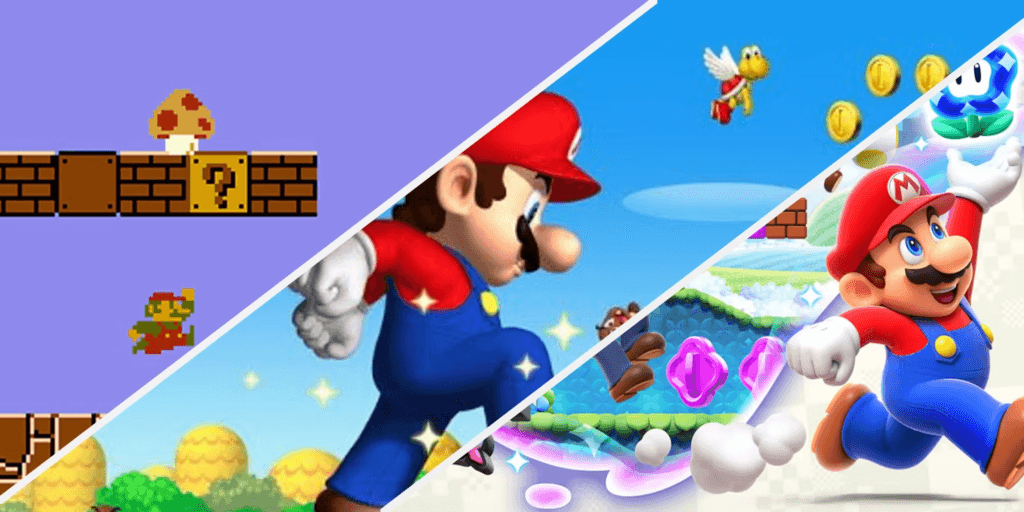
This year, 17,463.7 million downloads of casual games—the most popular genre of mobile gaming—are anticipated globally. This category includes games that are simple to learn, have quick play periods, and have minimal entrance barriers.
Favorite titles like Candy Crush Saga and other easy puzzle games fall within this category.
When creating a casual game, think about your target demographic as well as any untapped markets to help you create a niche for your application. For instance, via the creation of popular casual games like Fashion Queen, the gaming company Tamatem rose to prominence as the leading provider of games for Arabic-speaking gamers.
Racing Games
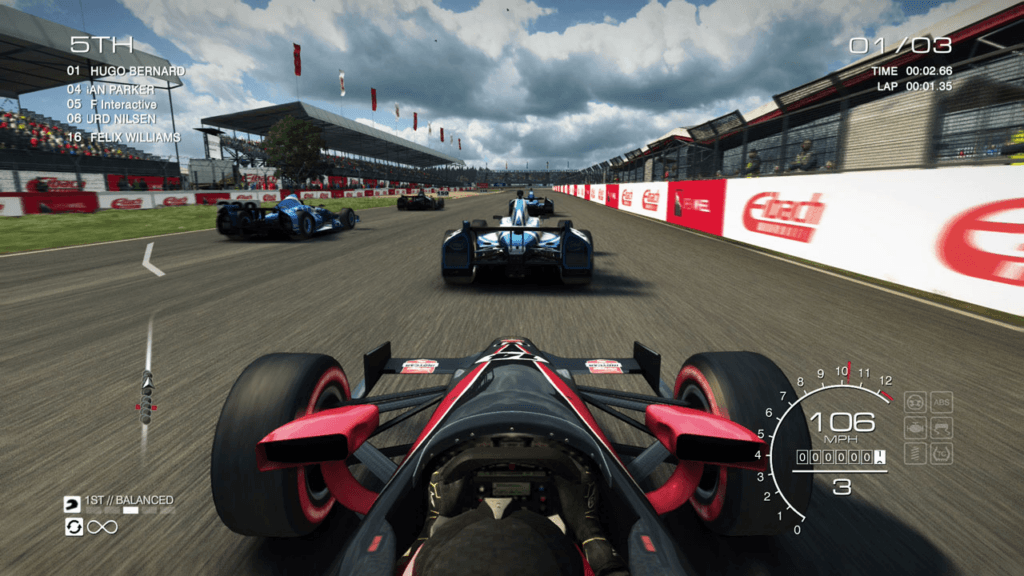
The concept underlying racing games is easy to understand. Competing against other players and themselves for the fastest time, players race through a course. These games frequently come under the arcade game umbrella as well. In SBK16, for instance, players may opt to take on the role of racers from the official Superbike World Champion squad.
There are other types of games that you can play on your mobile device such as wordplay, Trivia, any particular sports, cards, puzzles, etc, the list goes endless. Let’s see what affects the cost of building such gaming apps.
Factors Affecting the Mobile Game App Development Cost
Game Complexity & Features
Development expenses are greatly impacted by how complicated the game mechanics are. More time and money must be allocated to the creation of games with complicated features, sophisticated AI, and elaborate gameplay mechanisms.
Games that are extremely feature-rich and engaging, including those with multiplayer possibilities, augmented reality gaming components, or a plethora of customization options, typically demand a higher testing and development budget.
Graphics and Visual Elements
A game’s visual attractiveness plays a big part in how successful it is. A larger budget for design and production is required for games with realistic landscapes, intricate animations, and excellent visuals.
The complexity of 3D game creation necessitates highly qualified experts in modeling, texturing, and animation, which drives up overall costs. Creating a 3D game is usually more expensive than creating a 2D game.
The entire cost is influenced by the degree of detail, the intricacy of the animation, and the requirement for expert designers and developers.
Development Platform & Technology
Costs are impacted by the development platform selection. The cost of developing for both the iOS and Android app stores goes up since the game must be modified to fit each platform’s particular requirements and criteria.
The choice of a technological stack, which includes frameworks and gaming engines, affects development expenses and time. Because they demand specialized knowledge, using cutting-edge technologies like virtual reality (VR) and augmented reality (AR) can boost costs.
Testing and Debugging
Debugging and game testing are essential steps in the quality assurance process that guarantee customers have a smooth and engaging gaming experience. Thorough testing is essential to guarantee a fun and bug-free gaming experience.
With a focus on mobile app testing, testing includes finding and fixing problems with gameplay, user interface, and compatibility across several platforms. The cost of quality assurance increases with the extent of the testing procedure.
A rigorous testing methodology includes testing on many devices, particularly across different operating systems and screen sizes.
Development Costs Of Popular Mobile Game Apps
Popular mobile game applications can have very different development costs depending on a number of variables, including complexity, platform, and design.
The fact that these popular games frequently require large financial outlays reflects the dynamic and competitive character of the mobile gaming trends and market.
The following information relates to the price of developing popular games for mobile apps:
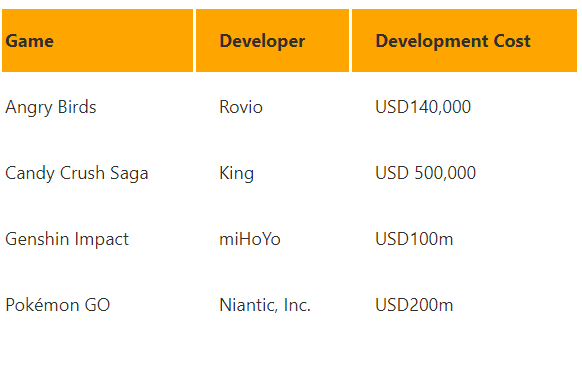
Which Technologies To Use For Game App Development?
Choosing a certain gaming engine to create your mobile game app is unquestionably a crucial factor in the overall cost of app development.
Even yet, there are a lot of innovative technologies and popular game development trends for mobile devices, including a few very popular game engines. These are a few of the well-known ones:
1. Unity

Unity, the most popular game creation engine worldwide with all the necessary features and functions, is a top choice at DianApps.
Designed for cross-platform game app development, it is a fully functional suite that is free for novice app developers making under $100,000 per year.
However, it comes with higher subscription costs due to its added capabilities and more complex company needs.
- Unity Pro edition: $2,040 per year or USD 185 per month per seat
- Version of Unity Industry: $4,950 per year or USD 450 per month per seat
- The engine is very compatible with 2D and 3D games and functions flawlessly across all mobile, desktop, online, and console platforms—even with subscription fees.
Among the top Unity games are Escape Plan, Angry Birds 2, Wasteland 2, and Temple Run Trilogy, to mention a few.
2. Cocos2d-X
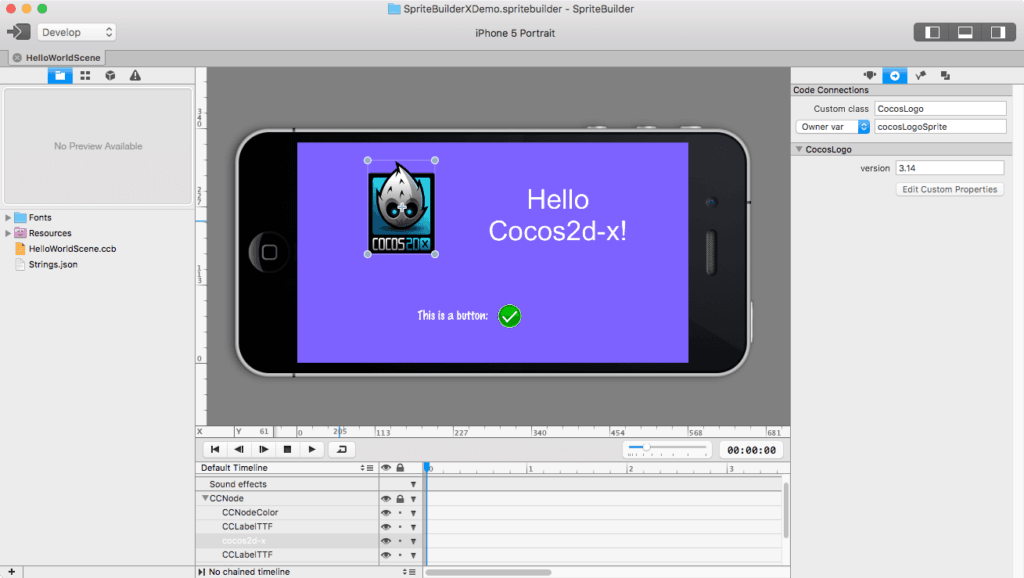
The C++ language serves as the foundation for this open-source, cross-platform game development engine, which is highly favored for gaming apps that emphasize user interfaces.
It is also quite functional and simple to learn, thanks to the integration of Lua and JavaScript bindings.
DianApps strongly favors this game engine due in large part to its lightweight, sturdy, and extremely result-driven nature.
Additionally, by enhancing the overall performance of the app, it expedites the game creation process.
How Can You Reduce The Cost of Mobile Game App Development?
A deliberate approach to resource allocation, efficiency, and budgeting is necessary to lower game production expenses. These are essential actions to guarantee cost savings:
Make Early Budget Plans
Establish a clear financial plan at the outset of your project that accounts for all development expenses.
You can better track expenses and manage funds during the development process. If you create a thorough financial strategy before starting the project.
Give Features Priority
Determine what the essential components of your game are, then rank them in order of significance and effect on gameplay.
Your game’s vital elements may be well-developed without incurring excessive costs if you concentrate time and resources on them.
Think About Contracting Out
It may be more affordable to outsource some aspects of the game production process, such music and art design.
It reduces costs and frees up your own staff to focus on important development work by reducing effort.
Employ Open-Source Tool
Examine open-source substitutes for software and technologies used in game creation.
These affordable solutions can effectively replace pricey proprietary instruments without sacrificing the caliber of your work.
Test and Retest
Cost reduction benefits greatly from frequent testing and iteration.
Early problem detection and resolution in the development cycle help avoid expensive delays and guarantee the game’s continued high caliber.
Throughout the development phase, ongoing testing and enhancement can result in a better and cost-effective way.
Conclusion
The market for mobile games is projected to grow to USD 284.4 billion by the end of 2030. It is enormous, isn’t it?
Now is the perfect moment for you if you want to grow your mobile game software business to new heights. And realize enormous earnings potential. Get in touch with DianApps, a top mobile game development company, to produce extraordinary content.
Our group of animators, testers, designers, and developers. Will make sure your game app succeeds in the cut-throat industry of today.










Leave a Comment
Your email address will not be published. Required fields are marked *